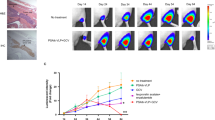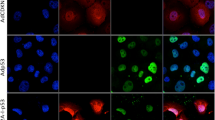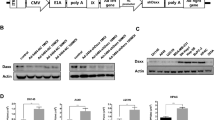Abstract
It is estimated that there will be >184,500 new cases of prostate cancer and 42,000 prostate cancer deaths in the United States this year. In the majority of patients diagnosed with prostate cancer, the disease will be too advanced for cure with standard medical treatment. New therapeutic strategies against advanced prostate cancer are desperately needed. As alterations in tumor-suppressor gene p16 are common in prostate cancer, one novel approach is gene therapy using a replication-deficient, E1/E3-deleted adenovirus type 5 containing a p16 under the control of a truncated Rous sarcoma virus promoter (AdRSVp16). In vitro, PC-3 cells that had been stably transfected with p16 expression vector under the control of an inducible promoter had a 70% reduction in cell number compared with the parental and control vector-transfected PC-3 cells. Similarly, AdRSVp16 significantly inhibited the growth of PPC-1 and PC-3 prostate cancer cells in culture. Furthermore, PPC-1 tumors grown in nude mice treated by a single injection of AdRSVp16 had a marked reduction in tumor size compared with untreated control-treated or viral control-treated PPC-1 tumors. Animals bearing tumors treated with AdRSVp16 also had longer survival. Adenovirally mediated expression of transgene was detected in xenograft tumors for at least 2 weeks. Taken together, these results suggest that AdRSVp16 should be considered for prostate cancer gene therapy in human clinical trials.
This is a preview of subscription content, access via your institution
Access options
Subscribe to this journal
Receive 12 print issues and online access
$259.00 per year
only $21.58 per issue
Buy this article
- Purchase on Springer Link
- Instant access to full article PDF
Prices may be subject to local taxes which are calculated during checkout
Similar content being viewed by others
Author information
Authors and Affiliations
Corresponding author
Rights and permissions
About this article
Cite this article
Steiner, M., Zhang, Y., Farooq, F. et al. Adenoviral vector containing wild-type p16 suppresses prostate cancer growth and prolongs survival by inducing cell senescence. Cancer Gene Ther 7, 360–372 (2000). https://doi.org/10.1038/sj.cgt.7700151
Received:
Accepted:
Published:
Issue Date:
DOI: https://doi.org/10.1038/sj.cgt.7700151
Keywords
This article is cited by
-
Evaluation of the use of therapeutic peptides for cancer treatment
Journal of Biomedical Science (2017)
-
IGF-1R inhibition enhances radiosensitivity and delays double-strand break repair by both non-homologous end-joining and homologous recombination
Oncogene (2014)
-
Effect of exogenous p16ink4a and hRb1 genes on cell cycle regulation of osteosarcoma cell
Journal of Huazhong University of Science and Technology [Medical Sciences] (2005)
-
Is gene therapy the answer for prostate cancer?
Prostate Cancer and Prostatic Diseases (2004)
-
Anti-migratory and anti-angiogenic effect of p16: A novel localization at membrane ruffles and lamellipodia in endothelial cells
Angiogenesis (2004)



